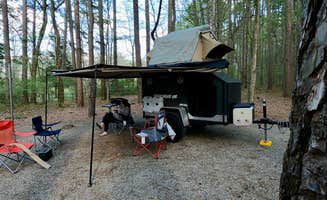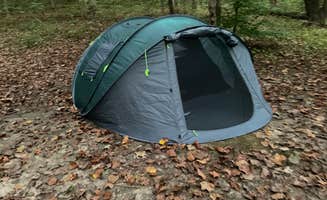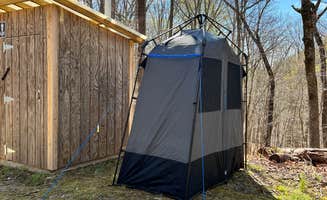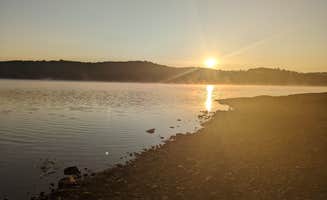Dispersed camping near Belknap, Illinois offers campers access to the Shawnee National Forest's diverse terrain of sandstone outcroppings, hardwood forests, and cypress swamps. The region sits at elevations ranging from 300-700 feet above sea level, creating varied microclimates throughout the forest. Seasonal water levels affect access to many primitive sites, with spring bringing flowing creeks and fall often resulting in dry creek beds.
What to do
Rock climbing at Jackson Falls: The sandstone bluffs at Jackson Falls provide numerous climbing routes for all skill levels. "Jackson Falls is popular with climbers and has many marked routes," according to climbers who frequently visit. During drier periods, the climbing experience changes dramatically as one visitor noted, "We went during a dry spell and there was no running water at the falls! Still had a blast there though!"
Hiking forest trails: Extensive trail networks connect multiple campsites throughout the Shawnee National Forest. At Trail of Tears State Forest, visitors can access remote hiking areas within minutes of their campsite. "Excellent for tent camping when you want relatively easy access and still feel a bit of solitude," reports one camper who enjoyed the forest's trail system.
Lake activities: Swimming, fishing, and paddling opportunities abound at lakes throughout the region. "The views of the lake are amazing, and this is a quiet area that allows for easy kayaking or other small water craft. There is a boat ramp, and zero entry areas into the water for launching," reports a visitor to lakeside camping areas near Belknap.
What campers like
Secluded sites: Many dispersed camping areas around Belknap offer privacy despite their accessibility. At Jackson Falls Dispersed, "secluded camp sites were easy to find, isolation was achieved, garbage was very minimally found, and the trails were long and winding," according to a summer visitor.
Wildlife viewing: The forest setting provides opportunities to observe local wildlife. However, campers should prepare for insects, especially during warmer months. One visitor noted, "The bugs were insane and 40 must've flown into my car when I opened the door for a split second," highlighting the need for proper repellent.
Seasonal waterfalls: Spring rainfall creates temporary waterfalls throughout the region. "Beautiful location. Definitely off the beaten path," reports a camper at Jackson Falls, though many note that fall brings dry conditions when "there was no running water at the falls!"
What you should know
Water crossings: Many dispersed sites require navigating creek crossings that vary seasonally. At Jackson Falls, one camper in a large vehicle reported, "We run a 28ft RV and we're able to cross the first water wash without problem. We are a Jeep family so I may have more experience than others in off-roading." Less experienced drivers should consider alternatives during wet periods.
Limited facilities: Most dispersed camping areas have minimal amenities. A Dutchman Lake Camp visitor advised, "Bring everything you need, there is no water source and bring lots of wood. We scavenged wood from the hills around but ultimately had to leave and purchase wood."
Cell service: Connectivity varies dramatically throughout the region. "Lost cellphone service immediately upon entering reserve, FYI," reports one Jackson Falls camper, while another noted, "I didn't have T-Mobile cellphone reception." Some sites offer better coverage, as a Dutchman Lake visitor confirmed: "Beautiful little spots as you come in. Quiet and easy to get too. Verizon works well."
Tips for camping with families
Beach access: Lake Glendale Recreation Area offers family-friendly swimming options. "A nearby beach is available to enjoy during the summer as well as hiking trails," notes one visitor. Another adds, "The family that takes care of the campground was very nice and accommodating, and the sites were well-maintained. The beach and swimming area was so nice for us enjoy."
Playground facilities: Some developed campgrounds include play areas for children. "Lake Glendale is a true southern Illinois gem. They have recently improved the shower houses, the kids love the playground, and there is SO much shade!" reports a family that visits regularly.
Hiking difficulty: Consider trail difficulty when planning family outings. "The trail around the lake is about 3 miles; a nice hike that really gives you a good look at the park," notes a Lake Glendale camper, describing terrain manageable for most ages.
Tips from RVers
Site selection: Dispersed Campsite Shawnee National Forest offers accessible parking for various vehicle types. "Love this spot! It's easily accessible by all rig types. Backs up to the open forest and you pull right back onto the highway," reports an RV camper.
Road conditions: Access roads vary significantly in quality. At Jackson Falls, a camper warned, "Grave Road getting there was a bit rough for my Ram Promaster. Hill down to trail head could get slick if wet weather." Another camper advised, "Car camped without any issues but it's worth mentioning that I didn't have T-Mobile cellphone reception and the bathroom was a bit dirty. Also there was a shallow creek crossing right before the camping areas that I was worried about when I arrived at night, but I realized in the morning that it was not a big deal even for 2WD vehicles."
Campsite leveling: Many primitive sites require leveling equipment. "Be sure to make sure you set the correct location into GPS. We ended up at the wrong location at first try," advises a Dutchman Lake visitor, highlighting the importance of proper navigation when seeking suitable RV spots in dispersed camping areas near Belknap.





